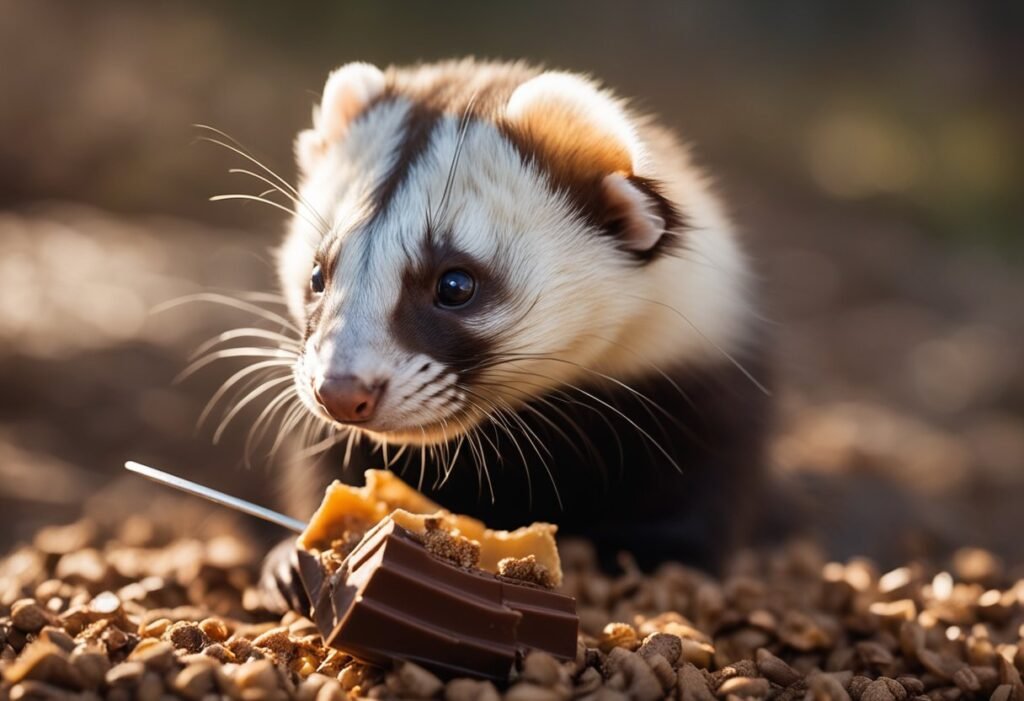Ferrets are curious and playful animals that have become increasingly popular as pets in recent years. As with any pet, it is important to provide them with a healthy and balanced diet. However, many pet owners may wonder if it is safe to give their ferrets certain human foods, such as chocolate.

Chocolate is a popular treat for humans, but it contains a chemical called theobromine that is toxic to many animals, including dogs and cats. Theobromine can cause a range of symptoms, from mild digestive upset to seizures and even death. Given the similarities between ferrets and other domestic animals, it is reasonable to assume that chocolate may be harmful to them as well. However, the answer to the question of whether or not ferrets can eat chocolate is not quite so straightforward.
While chocolate is generally considered unsafe for most animals, including ferrets, the amount of theobromine contained in chocolate can vary depending on the type and quality of the chocolate. Additionally, the size and health of the ferret can also play a role in how they react to theobromine. Therefore, it is important for pet owners to understand the risks associated with feeding their ferrets chocolate and to make informed decisions about their pet’s diet.
Can Ferrets Eat Chocolate?

Ferrets are obligate carnivores, which means they require a diet high in animal protein to thrive. While they can eat some fruits and vegetables in moderation, chocolate is not a suitable food for ferrets.
Chocolate contains theobromine, a chemical compound that is toxic to ferrets and can cause a range of health problems, including vomiting, diarrhea, hyperactivity, tremors, seizures, and even death. The severity of the symptoms depends on the amount of chocolate consumed and the size of the ferret.
Even a small amount of chocolate can be dangerous for ferrets, so it’s important to keep all chocolate products out of their reach. This includes dark chocolate, milk chocolate, and white chocolate, as well as chocolate-flavored treats and baked goods.
If you suspect that your ferret has ingested chocolate, it’s important to seek veterinary care right away. Your vet may induce vomiting or administer medication to help your ferret recover from the toxic effects of chocolate.
In summary, chocolate is not a safe or suitable food for ferrets. It’s important to provide your ferret with a balanced diet that meets their nutritional needs and to keep all chocolate products out of their reach to prevent accidental ingestion.
Toxicity of Chocolate in Ferrets
Theobromine and Caffeine
Chocolate contains a compound called theobromine, which is toxic to ferrets. This compound is a type of alkaloid and belongs to the same family as caffeine. Theobromine and caffeine can cause various health problems in ferrets, including increased heart rate, seizures, and tremors. Ferrets are particularly sensitive to theobromine and caffeine, and even a small amount can be harmful to their health.
Symptoms of Chocolate Poisoning
If a ferret ingests chocolate, they may exhibit symptoms such as vomiting, diarrhea, and restlessness. In severe cases, the ferret may experience seizures, tremors, and an increased heart rate. The severity of the symptoms depends on the amount of chocolate ingested and the size of the ferret. If a ferret exhibits any of these symptoms after ingesting chocolate, it is important to seek veterinary care immediately.
It is important to note that not all types of chocolate are equally toxic to ferrets. Dark chocolate and baking chocolate contain higher amounts of theobromine and caffeine compared to milk chocolate. Therefore, it is crucial to keep all types of chocolate away from ferrets to prevent accidental ingestion.
In conclusion, chocolate is toxic to ferrets due to the presence of theobromine and caffeine. Ferrets are particularly sensitive to these compounds, and even a small amount of chocolate can cause serious health problems. It is important to keep all types of chocolate away from ferrets to ensure their health and well-being.
Why Chocolate Is Harmful to Ferrets

Digestive System Differences
Ferrets have a different digestive system than humans, which makes them more susceptible to the harmful effects of chocolate. Ferrets have a shorter digestive tract, which means that food moves through their system quickly. This can lead to a faster absorption of toxins, such as theobromine, found in chocolate. Theobromine can cause a variety of health problems in ferrets, including vomiting, diarrhea, and even seizures.
Metabolic Rate Concerns
Ferrets have a high metabolic rate, which means that their bodies process food and toxins quickly. This can be a problem when it comes to chocolate, as theobromine can build up in their system more quickly than in humans. Even a small amount of chocolate can be toxic to a ferret and cause serious health problems.
It is important to note that chocolate should never be given to ferrets as a treat or as part of their diet. If a ferret accidentally ingests chocolate, it is important to seek veterinary care immediately.
Immediate Actions If a Ferret Eats Chocolate
If a ferret eats chocolate, it is essential to take immediate action to prevent any potential health hazards. Chocolate contains theobromine, which is toxic to ferrets and can lead to severe health complications. The following are the immediate actions that should be taken if a ferret consumes chocolate.
Veterinary Care Procedures
The first step that should be taken is to contact a veterinarian immediately. Ferrets are sensitive animals, and the toxic effects of theobromine can occur rapidly. A veterinarian will be able to advise on the best course of action to take based on the severity of the situation.
Upon arrival at the veterinarian’s office, the ferret will undergo a physical examination to determine the extent of the damage caused by the chocolate. The veterinarian may also conduct blood tests to check for the presence of theobromine in the ferret’s system.
Home Care and Monitoring
After receiving veterinary care, the ferret will need to be monitored closely at home. The following are the steps that should be taken to ensure the ferret’s safety:
- Keep the ferret in a quiet, dark room to reduce stress levels.
- Provide plenty of fresh water to help flush out the toxins.
- Monitor the ferret’s behavior closely for any signs of distress, such as vomiting or diarrhea.
- Keep a record of the ferret’s symptoms and report any changes to the veterinarian immediately.
It is crucial to note that chocolate should never be given to ferrets as a treat. If a ferret accidentally consumes chocolate, it is essential to take immediate action to prevent any potential health hazards. By following the above steps, the ferret’s chances of recovery will significantly improve.
Preventing Chocolate Exposure
Ferrets are curious animals that love to explore their surroundings. However, this can sometimes lead to them ingesting harmful substances such as chocolate. As a responsible ferret owner, it is important to take precautions to prevent chocolate exposure.
Safe Treat Alternatives
While chocolate should be avoided, there are plenty of safe treat alternatives that you can offer your ferret. Some examples include:
- Ferret-specific treats: There are many treats on the market that are specifically designed for ferrets. These treats are usually made with safe ingredients and are a great option for rewarding your ferret.
- Meat-based treats: Ferrets are obligate carnivores, which means they require a diet that is high in protein. Offering your ferret meat-based treats such as cooked chicken or turkey can be a healthy and tasty alternative to chocolate.
- Ferret-safe fruits and vegetables: While ferrets are primarily meat eaters, they can also enjoy small amounts of fruits and vegetables. Some safe options include bananas, carrots, and blueberries.
Ferret-Proofing Your Home
In addition to offering safe treats, it is important to ferret-proof your home to prevent chocolate exposure. This involves taking steps to ensure that your ferret cannot access chocolate or other harmful substances. Some tips for ferret-proofing your home include:
- Keeping chocolate out of reach: Chocolate should be stored in a secure location that is inaccessible to your ferret. This includes keeping chocolate bars, cocoa powder, and other chocolate products in a sealed container or cupboard.
- Monitoring your ferret: It is important to supervise your ferret at all times to ensure that they do not access chocolate or other harmful substances. This is especially important if you have other pets or young children in the home.
- Providing a safe environment: Ferrets are active animals that require plenty of space to play and explore. Providing a safe and enriching environment can help prevent boredom and reduce the likelihood of your ferret ingesting harmful substances.
By taking these precautions, you can help keep your ferret safe and healthy. Remember, prevention is key when it comes to chocolate exposure.
Understanding Ferret Nutrition
Dietary Requirements
Ferrets are obligate carnivores, meaning their diet must consist of meat-based proteins to meet their nutritional needs. They require high levels of animal protein and fat to maintain their health. It is recommended that ferrets consume a diet that is at least 34% protein and 20% fat.
Ferrets also require certain vitamins and minerals, such as vitamin A, vitamin D, and taurine. These nutrients are essential for maintaining healthy skin, coat, and immune function. It is important to ensure that a ferret’s diet contains adequate amounts of these nutrients.
Healthy Treat Options
While ferrets require a meat-based diet, it is important to note that not all meats are suitable for their consumption. Ferrets should not be fed processed meats or those high in salt, such as bacon or deli meats.
When it comes to treats, it is important to choose options that are healthy and appropriate for ferrets. Some healthy treat options for ferrets include raw or cooked meat, eggs, and small amounts of fruits and vegetables.
It is important to avoid feeding ferrets chocolate, as it contains theobromine, which can be toxic to them. Other foods to avoid include dairy products, sugary treats, and anything high in carbohydrates.
Overall, it is important to provide ferrets with a balanced and nutritious diet that meets their dietary requirements. By choosing healthy food options and avoiding harmful foods, owners can ensure that their ferrets remain healthy and happy.
Frequently Asked Questions
What should I do if my ferret ingests chocolate?
If your ferret ingests chocolate, it is important to seek veterinary care immediately. Chocolate contains theobromine, which can be toxic to ferrets in even small amounts. Symptoms of chocolate toxicity in ferrets include vomiting, diarrhea, restlessness, and seizures.
What are the health risks of chocolate to ferrets?
Chocolate contains theobromine, which can be toxic to ferrets in even small amounts. Theobromine can cause heart problems, seizures, and even death in ferrets. It is important to keep chocolate and other human foods that are harmful to ferrets out of their reach.
How much chocolate is considered lethal for ferrets?
The amount of chocolate that is considered lethal for ferrets can vary depending on the type of chocolate and the weight of the ferret. As a general rule, it is best to avoid giving chocolate to ferrets altogether.
Are there any safe alternatives to chocolate for ferrets?
Yes, there are many safe alternatives to chocolate for ferrets. Some good options include cooked chicken, cooked eggs, and small pieces of fruit or vegetables. It is important to avoid giving ferrets any human foods that are high in sugar, salt, or fat.
What types of human foods are harmful to ferrets?
There are many human foods that are harmful to ferrets, including chocolate, caffeine, alcohol, onions, garlic, and grapes. These foods can cause a variety of health problems, including digestive issues, kidney failure, and even death.
Can ferrets have any chocolate-flavored treats?
No, ferrets should not be given any chocolate-flavored treats. Even if the treat does not contain actual chocolate, it may contain other ingredients that are harmful to ferrets. It is best to stick to treats that are specifically designed for ferrets.





